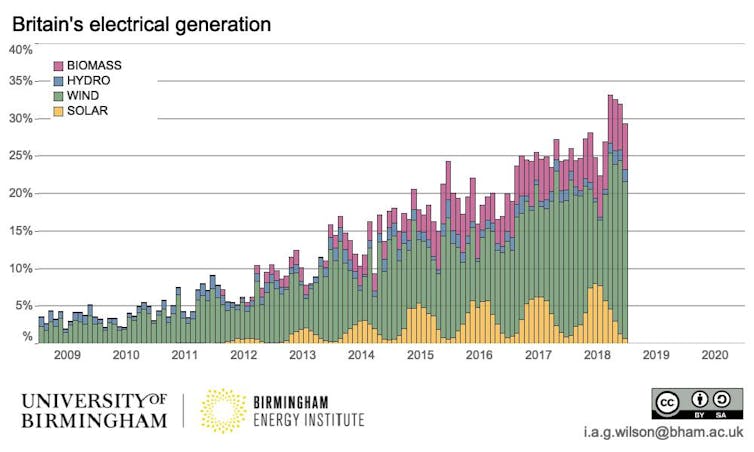Britain has shifted 30% of its electricity away from fossil fuels in just nine years
Nine years ago, Britain generated nearly 75% of its electricity using natural gas and coal. In 2018, this dropped to under 45% – a remarkable transition away from fossil fuels in under a decade.
As energy efficiency improved, demand fell, and the UK generated less electricity than at any point since 1994. Our own analysis below looks at the past year, using similar data for Great Britain (as Northern Ireland has a separate power system), and we include net imports from France, the Netherlands and Ireland as an overall part of electrical generation. Here are a few things we found:
In 2018, Britain was coal-free for a record 1,898 hours – that’s up from just 200 hours in 2016. Coal generation fell for the sixth year in a row, and the country now has substantial periods without coal power (the longest stretch was just over three days straight).
For comparison, the 5% of electricity generated from coal was a broadly similar level to the combined total of solar and hydro (see table at end of the article). Wind increased its output to 17% of the total, and combined with solar these two renewables generated more electricity than nuclear – another significant milestone.
However, low levels of coal generation averaged across the year mask its importance at times when the electrical demand is particularly high. For example, over the week of the Beast from the East cold snap in February 2018, the gas system experienced significant stress and coal stepped in to provide nearly a quarter of Britain’s electricity. As coal generation is set to be phased out by 2025, the electrical system needs to continue to find alternative power sources to cope during extreme weather events.
Our analysis shows that annual renewable generation has increased by 27 terawatt hours (TWh) over the three years since 2015. This is particularly impressive considering the Hinkley Point C nuclear plant will produce a similar annual amount of electricity but will take three times as long to build (from contract signing).
Challenges ahead
But what about the decade ahead? Could Britain repeat its success since 2010 and reduce its coal and natural gas generation by a further 30 percentage points? Under this scenario, the country would then generate just a sixth of its electricity from fossil fuels.
It’s definitely possible, but the next decade will be more challenging for two main reasons: the demand for electricity is expected to rise rather than fall, and incorporating ever greater levels of variable renewable generation will need additional flexibility.
To achieve this, new renewable generation – new solar panels, new turbines, new hydro, tidal, marine and biomass generation – will have to replace an estimated 100 TWh per year (about four Hinkley Point Cs) from fossil fuels. That would require a build programme that was broadly 50% greater than the previous nine years.
Given the continued development of offshore wind in particular, this seems challenging but achievable. Solar and wind prices keep falling, which will help. Indeed, the UK’s business and energy secretary Greg Clarke recently said that “it is looking likely that by the mid 2020s, green power will be the cheapest power. It can be zero subsidy”.
These vehicles would need the equivalent of three Hinkley Point Cs to charge them over the year.
This is also a similar level to current generation from renewables. The UK also needs to consider how to fill the gap that would be lost from fuel duty, which is forecast to raise around £28 billion this financial year.
If charging these vehicles adds to electrical demand at peak times, there would be substantial new infrastructure costs (more pylons, stronger electrical sub-stations). If Britain adopts a smarter system, fleets of electric vehicles could provide network support by changing their times of charging or even providing electricity back to the grid. This could provide a massive new form of flexibility that is needed to accommodate greater levels of weather dependent renewable generation. This is not an easy task, though, and needs better communication between vehicle, owner and power companies.
Steady progress
Overall, 2018 saw steady progress for low carbon generation, including record months for wind, biomass and, mid-heatwave, solar:

Looking to 2019, with more renewable capacity being installed, it is possible that solar could overtake coal, and renewables could generate more than nuclear for every single month. They could also generate more than coal and gas combined over a month for the first ever time. If any of these do happen, it will be yet another indication of the speed at which Britain’s electricity system is changing.
The electrical generation data is from Elexon and National Grid. Data from other analyses (such as BEIS or DUKES) will differ due to methodologies and additional data, particularly by including combined heat and power, and other on-site generation which is not monitored by Elexon and National Grid. Renewables in this analysis = wind + solar + hydro + biomass.
Grant Wilson, Lecturer in Chemical Engineering, University of Birmingham and Iain Staffell, Lecturer in Sustainable Energy, Imperial College London
This article is republished from The Conversation under a Creative Commons license. Read the original article.
